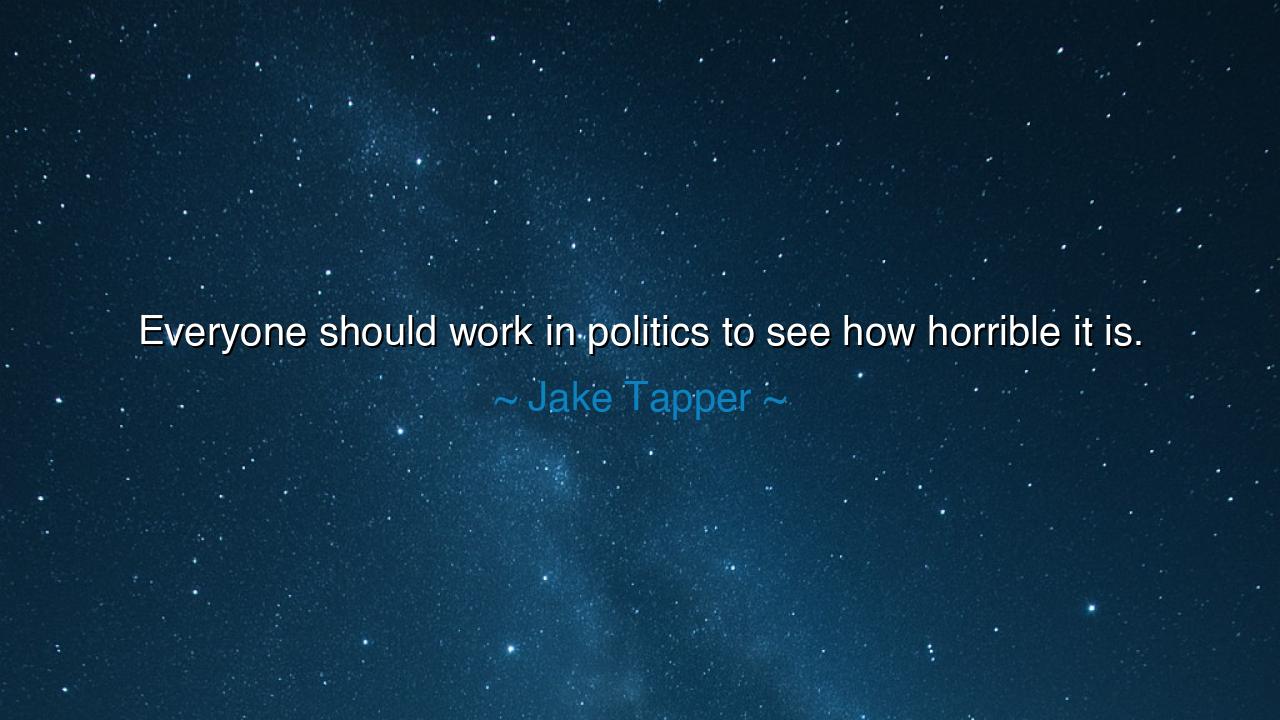
Everyone should work in politics to see how horrible it is.






When Jake Tapper declared, “Everyone should work in politics to see how horrible it is,” he tore the veil from a world too often glamorized from afar. In his words is the bitter wisdom that politics, though clothed in promises of noble service, is a realm tangled in ambition, compromise, and deceit. To step inside is to see the clash between high ideals and base desires, between the call to serve and the hunger to rule. It is a place where lofty speeches often conceal sordid bargains, and where truth itself is bartered like coin.
The ancients too knew this grim truth. In Rome, Cicero praised the Republic with his orations, yet behind the Senate’s marble pillars lay conspiracies, corruption, and betrayal. Even Plato warned in his Republic that those who enter public life risk the corruption of their souls, for the temptations of power are as fierce as the temptations of gold. Tapper’s words echo these timeless warnings: to work in politics is to see not only its necessity, but its rot.
And yet, the quote also suggests a lesson of humility. Those who judge from afar may think solutions simple, purity possible. But within the machine of government, where compromise is constant and every choice offends someone, the reality is harsher. By urging “everyone” to enter, Tapper invites people to witness the struggle themselves—not to romanticize, but to understand. For the disillusionment gained within can sharpen the citizen’s discernment without.
History offers vivid proof. In the years of the French Revolution, idealists flooded into the Assembly, believing they could birth a pure democracy overnight. Many left broken, horrified by intrigue, factionalism, and bloodshed. They had touched the machinery of politics and felt its horror. Yet from that horror also came lessons that shaped modern republics. So too, Tapper’s words remind us that the ugliness of politics, once seen, can guide us toward demanding better.
Thus, let his teaching endure: do not be seduced by the glitter of campaigns or the eloquence of leaders. Enter, if you dare, and see the truth—that politics is often cruel, corrosive, and wearying. But also know this: only by facing the horror with open eyes can citizens build systems less corrupt, less cynical, and more worthy of the name democracy. For wisdom comes not from gazing at politics from a distance, but from walking through its shadows and refusing to be swallowed by them.






PTphong tttt
It’s interesting to think about Jake Tapper’s take on politics. He seems to imply that working in politics is a harsh experience that reveals how unappealing the system can be. But is this negativity something that could be changed, or is it just an inevitable part of the process? Should we be encouraging more people to work in politics, even knowing how frustrating it can be, to create a more transparent and accountable system?
VHVy Hoang
Jake Tapper’s quote seems to reflect the harsh reality of politics. I wonder if his view is too cynical, though. Yes, politics can be frustrating and difficult, but isn’t that what makes real change so rewarding? If more people experienced the challenges of politics, would we see more empathy or more disillusionment? How do we balance the inherent difficulties with the need for positive political engagement and reform?
QAnguyen Quynh Anh
Jake Tapper's perspective on politics as a 'horrible' experience raises a valid point about the often toxic nature of the political world. If people truly understood what it was like, would they still choose to get involved, or would they shy away? It makes me wonder if this sentiment creates apathy or if it could motivate more people to push for change from within, knowing what they’re getting into.
HNBui Duy Hoai Ngoc
This quote by Jake Tapper is striking. It’s almost like a warning about the disillusionment that comes with working in politics. I wonder, though, if this discourages people from getting involved in the first place. Is it healthy to focus so much on the negative aspects? Could there be a way to make the political system less frustrating, or are the challenges simply inherent to the nature of governance?
NDHanh Nguyen Duc
Jake Tapper’s comment really made me pause. It seems like he’s suggesting that once you get involved in politics, the glamour of it all fades away, revealing how complex and frustrating it can truly be. Is this why so many people get disillusioned with the system? If everyone worked in politics, would we have a better understanding of its flaws, or would the frustration and negativity just turn people away from engaging at all?